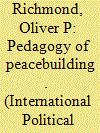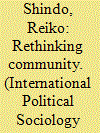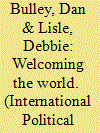|
|
|
Sort Order |
|
|
|
Items / Page
|
|
|
|
|
|
|
| Srl | Item |
| 1 |
ID:
114112


|
|
|
|
|
| Publication |
2012.
|
| Summary/Abstract |
During the last decade, the framing of climate change has been significantly transformed. It has turned from a gradually intensifying, long-term challenge into a highly nonlinear danger that threatens national security. This article explores the reasons, and points to the consequences, of this change. Drawing from actor-network theory, it argues that practices and materials have become entangled across professional and disciplinary contexts. The growing association of chaotic climate change encompasses climatologists, who challenge the mainstream ontology of climate; economists, who started to revisit their economic models; and strategic communities, which began to pick up nonlinear climate changes foregrounding national security. Methodologically, the principle of symmetry that underlies this research aims, as far as is possible, to transcend the dualistic notions of science and politics, and society and nature. The article thereby attempts to open up a debate about the usefulness of a symmetrical approach to enhance research both on global environmental governance in particular, and global politics in general.
|
|
|
|
|
|
|
|
|
|
|
|
|
|
|
|
| 2 |
ID:
114109


|
|
|
|
|
| Publication |
2012.
|
| Summary/Abstract |
A post-liberal peace engages with the politics of hybridity emerging from a mixture of contextual and international social, political, economic, cultural, and historical dynamics of peace. It represents an attempt to escape liberal enclosure and distant administration as well as contextual forms of violence in post-conflict zones-from Bosnia Herzegovina to Afghanistan. Critical agency as a form of resistance aimed at liberation from the structures of conflict, and structural violence-wherever they lie-rather than solely relying on external norms and capacity, is key. From this tension, a range of "local," transversal, and transnational agencies can be uncovered in many peacebuilding or statebuilding contexts, which may resist, modify, or co-opt intervention in unexpected ways. A hybrid form of peace emerges from this agonistic process, which points to an understanding of peacebuilding-as-liberation. Rather than producing subjects, this enables subjects to produce peace.
|
|
|
|
|
|
|
|
|
|
|
|
|
|
|
|
| 3 |
ID:
114111


|
|
|
|
|
| Publication |
2012.
|
| Summary/Abstract |
In this paper, I explore one way of thinking about political community. Drawing on Jean-Luc Nancy's idea of community, I suggest that community is not a full circle, but an open-ended line. Thinking community-as-a-line is to shift our focus from the completed pictures of community to the inception of community. In this way of thinking, community is a shared mode of being. I argue that at the heart of sharing lies translation-communication - or translation space - where one (singularity) is perpetually ingrained in others (plurality). The subject constantly "emerges" in relation to others in translation space. I argue that looking at community as a line is a way to avoid the statist boundary, the subject of which is situated either inside or outside. I further argue that the elusive subject in translation space engages in politics through escape.
|
|
|
|
|
|
|
|
|
|
|
|
|
|
|
|
| 4 |
ID:
114110


|
|
|
|
|
| Publication |
2012.
|
| Summary/Abstract |
Much recent work on culture and identity in International Relations (IR) has emphasized the causal role of ideas and institutions. I articulate a broader socialization process for collective identities via material elements of identity construction. I argue that combined with rituals and linked to myths and symbols, material representations of culture such as monuments and architecture form the collective memories of polities in a similar manner to the socializing effects of educational institutions and vernacular literature. I illustrate these claims with a comparison of materiality and praxis elements of identity construction in imperial Rome and late-modern Austria-Hungary, with concluding analysis of the role of material culture in the future of "European" identity in the EU.
|
|
|
|
|
|
|
|
|
|
|
|
|
|
|
|
| 5 |
ID:
114113


|
|
|
|
|
| Publication |
2012.
|
| Summary/Abstract |
London's successful bid for the 2012 Olympic Games presented a diverse, cosmopolitan city opening its arms and "welcoming the world." This article explores the apparently benign gesture of hospitality contained in London's official candidature files submitted in 2004 and asks how such a promise of inclusiveness is managed. We argue that London's depiction of itself as hospitable to every kind of visitor relies on subtle techniques of governmentality in which the subject positions of "host" and "guest" are imagined and produced in ways that make them more governable. By this, we are not referring to acts of authority, coercion, or discipline that exclude subjects or render them docile bodies within a rigid panoptical city. Rather, we are referring to the delicate ways in which the official bid document imagines and produces the ideal subject positions of host and guest and in so doing enables, encourages, and incentivizes certain behaviors. This analysis of urban welcoming takes us beyond reductive oppositions of hospitality and hostility, inclusion and exclusion, self and other. It focuses instead on how London's inclusive welcome produces a variety of host and guest positions (for example, the "Olympic Family," volunteers, guest workers), segregates them within the city, and then "conducts their conduct" in the areas of planning, security, transport, accommodation, education, and training. By analyzing the techniques of governmentality at work in London's 2004 bid document, this article foregrounds the enabling form of power driving the city's inclusive welcome and exposes its inherent micropolitics.
|
|
|
|
|
|
|
|
|
|
|
|
|
|
|
|
|
|
|
|
|